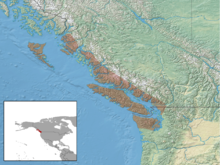Keen's myotis
| Keen's myotis | |
|---|---|

| |
| Scientific classification | |
| Domain: | Eukaryota |
| Kingdom: | Animalia |
| Phylum: | Chordata |
| Class: | Mammalia |
| Order: | Chiroptera |
| Family: | Vespertilionidae |
| Genus: | Myotis |
| Species: | M. keenii |
| Binomial name | |
| Myotis keenii (Merriam, 1895) | |

| |
Keen's myotis (Myotis keenii) is a species of vesper bat. It is found in British Columbia in Canada and in Washington and Alaska in the United States.[1] It is named after the Rev. John Henry Keen, who collected the specimen that formed the basis for the first scientific description of the species.[2] Classification for Keen's myotis formerly included the northern long-eared myotis (Myotis septentrionalis), resulting in older studies confusing the species for one another.[3]
Description
Measurements: Forearm 1.4-1.6 in., WT 0.25–0.33 oz (7.1–9.4 g). Average body length 8–9 cm, tail length 4–5 cm.[4] In appearance, Keen's myotis is very similar to other long-eared bats of the same range, with characteristic dark brown patches on the shoulders.[5]
Behavior
Keen's myotis prefers coastal habitats, but is often found in urban areas as well. It frequently roosts in trees and rock crevices.[6] It is nocturnal and insectivorous.[5] Keen's myotis probably exhibits the same breeding habits of other temperate vespertilionids, but there is little data available.[7]
Lifespan
In the wild, Keen's myotis is recorded living upwards of 12 years,[8] while in captivity, it is reported living 19 years.[7]
See also
References
- ^ a b Arroyo-Cabrales, J.; Álvarez-Castañeda, S.T. (2017). "Myotis keenii". IUCN Red List of Threatened Species. 2017: e.T14171A22055579. doi:10.2305/IUCN.UK.2017-2.RLTS.T14171A22055579.en.
- ^ "Keen's myotis". State University of New York College of Environmental Science and Forestry. Retrieved 7 November 2010.
- ^ [1] Arroyo-Cabrales, J.; Álvarez-Castañeda, S.T. (2017). "Myotis keenii". IUCN Red List of Threatened Species. 2017: e.T14171A22055579. doi:10.2305/IUCN.UK.2017-2.RLTS.T14171A22055579.en. Retrieved 11 November 2021.
- ^ "Mammals of Washington". Burke Museum. University of Washington. Retrieved 9 December 2014.
- ^ a b "Myotis Keenii". NatureServe Explorer. NatureServe. Retrieved 9 December 2014.
- ^ "COSEWIC Assessment and Update Report on the Keen's Long-eared Bat Myotis Keenii in Canada" (PDF). Sera Registry. COSEWIC. 2003. p. iv. Retrieved 9 December 2014.
- ^ a b Filla, Joe. "Myotis Keenii". Animal Diversity Web. University of Michigan Museum of Zoology. Retrieved 9 December 2014.
- ^ "COSEWIC Assessment and Update Report on the Keen's Long-eared Bat Myotis Keenii in Canada" (PDF). Sera Registry. COSEWIC. 2003. p. v. Retrieved 9 December 2014.
External links
- Keen's Myotis at the Smithsonian National Museum of Natural History

